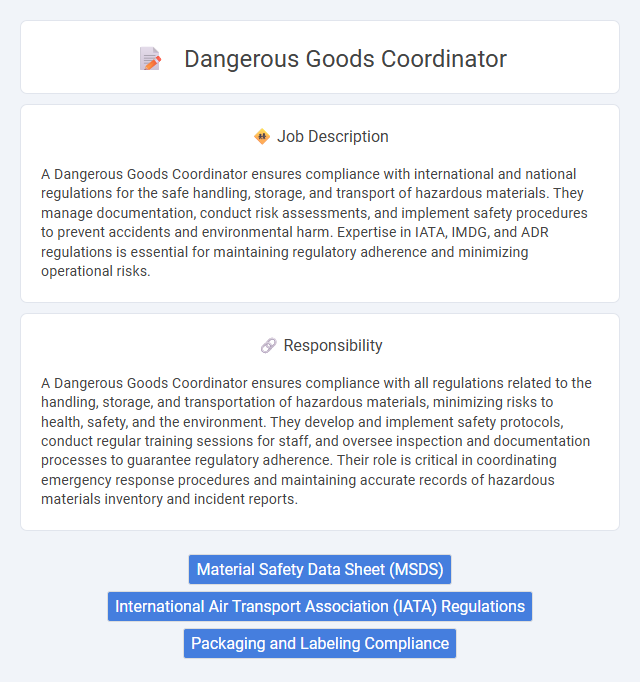
A Dangerous Goods Coordinator ensures compliance with international and national regulations for the safe handling, storage, and transport of hazardous materials. They manage documentation, conduct risk assessments, and implement safety procedures to prevent accidents and environmental harm. Expertise in IATA, IMDG, and ADR regulations is essential for maintaining regulatory adherence and minimizing operational risks.
Individuals with strong attention to detail and the ability to remain calm under pressure are likely to be well-suited for the role of Dangerous Goods Coordinator, as the job often involves handling hazardous materials and ensuring compliance with safety regulations. Those who thrive in environments requiring strict adherence to protocols and possess good organizational skills may have a higher probability of success in this position. Candidates with sensitivity to stress or difficulty managing complex safety requirements might find this role challenging.
Qualification
A Dangerous Goods Coordinator must possess comprehensive knowledge of international regulations such as IATA, IMDG, and ADR to ensure the safe handling and transport of hazardous materials. Certification in Dangerous Goods Safety Adviser (DGSA) or equivalent qualification is essential for compliance and risk management. Strong analytical skills and attention to detail enable accurate documentation and effective emergency response planning.
Responsibility
A Dangerous Goods Coordinator ensures compliance with all regulations related to the handling, storage, and transportation of hazardous materials, minimizing risks to health, safety, and the environment. They develop and implement safety protocols, conduct regular training sessions for staff, and oversee inspection and documentation processes to guarantee regulatory adherence. Their role is critical in coordinating emergency response procedures and maintaining accurate records of hazardous materials inventory and incident reports.
Benefit
The Dangerous Goods Coordinator role likely offers significant benefits such as enhancing workplace safety and ensuring regulatory compliance, which reduces the risk of accidents and costly penalties. This position may provide opportunities for professional growth through specialized training in hazardous materials management. Employees in this role could experience increased job security due to the essential nature of their responsibilities in industries handling dangerous goods.
Challenge
The role of a Dangerous Goods Coordinator likely involves managing complex regulations and ensuring strict compliance with safety standards, which poses significant challenges. Handling the transportation, storage, and documentation of hazardous materials probably requires constant vigilance and precise attention to detail. Navigating evolving legal requirements and mitigating potential risks might demand advanced problem-solving skills and thorough training.
Career Advancement
A Dangerous Goods Coordinator plays a critical role in ensuring compliance with hazardous materials regulations and coordinating safe transportation and storage processes. Mastery of regulatory frameworks such as IATA, IMDG, and DOT enables professionals to advance into senior safety management or compliance officer roles. Expertise in risk assessment and training facilitation also opens opportunities for leadership positions within logistics and supply chain safety departments.
Key Terms
Material Safety Data Sheet (MSDS)
A Dangerous Goods Coordinator specializes in managing hazardous materials compliance, ensuring all safety protocols align with regulatory standards such as OSHA and DOT. Proficiency in interpreting and utilizing the Material Safety Data Sheet (MSDS) is critical, as it provides detailed information on chemical properties, handling procedures, and emergency measures. The coordinator uses MSDS data to implement proper storage, transportation controls, and employee training programs, minimizing risks associated with dangerous goods.
International Air Transport Association (IATA) Regulations
A Dangerous Goods Coordinator ensures compliance with International Air Transport Association (IATA) Regulations by overseeing the safe packaging, labeling, and documentation of hazardous materials for air transport. This role requires thorough knowledge of IATA's Dangerous Goods Regulations (DGR), including classification, quantity limitations, and emergency response procedures to mitigate risks during shipment. Coordination with airlines, ground handlers, and regulatory bodies is critical to maintaining safety and legal adherence in the transport of dangerous goods.
Packaging and Labeling Compliance
A Dangerous Goods Coordinator ensures strict adherence to packaging and labeling regulations to maintain safety and regulatory compliance in the transport of hazardous materials. Expertise in IATA, IMDG, and DOT guidelines is critical for verifying that all packaging meets structural integrity standards and labeling displays accurate hazard symbols and handling instructions. This role requires meticulous documentation and continuous updates to regulatory requirements to prevent violations and ensure the safe distribution of dangerous goods.
 kuljobs.com
kuljobs.com